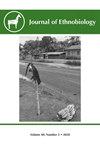Guatemalan Maya Q’eqchi’ Seasonal Calendar: Methods to Monitor Climate Change Locally
IF 1.3
3区 社会学
Q1 ANTHROPOLOGY
引用次数: 0
Abstract
Maya Q’eqchi’ villagers of Alta Verapaz, Guatemala fathom local indicators of climate change keenly. In a small-holder, maize-based, horticultural village, ethnographic interviews with village experts in hunting, agricultural production, and animal husbandry, and with non-expert/lay villagers recounted that many local climate- and subsistence-related activities and some traditional ecological knowledge (TEK) correspond to annual cycles or seasons. This research documents the local queues and timing of residents’ practices as a baseline for monitoring subsequent years’ activities and climate-related observations based on our interpretation of emic views, practices, and traditions. Using focus groups, we collected such traditional indicators to design a visual representation of a seasonal calendar, which we present herein. This seasonal calendar is a locally accessible tool to document monthly climate observations, agricultural and home garden activities, hunting, animal raising, and cultural activities during a complete annual cycle. We supplement observational and focus group data with semi-structured interview data about subsequent changes in weather patterns, which villagers identify as resulting from climate change. We suggest that Maya Q’eqchi’ villagers are active in their acknowledgment of climate change and are taking steps to document its effects on locally significant cultural activities, exemplifying Q’eqchi’ cultural capacity to adapt to ecological changes and to promote local resilience and cultural vitality. We demonstrate how seasonal calendars and the methods to create them may contribute to local and global understandings of TEK and climate change and annotate conventional anthropological methods as considerations for creating seasonal calendars in other cultural and ecological communities.危地马拉玛雅人Q ' eqchi '季节日历:监测当地气候变化的方法
危地马拉Alta Verapaz的玛雅Q ' eqchi村民敏锐地了解当地的气候变化指标。在一个以玉米为基础的小农园艺村,对狩猎、农业生产和畜牧业方面的村庄专家以及非专业/非专业村民的民族志采访表明,许多与当地气候和生存相关的活动以及一些传统生态知识(TEK)与年周期或季节相对应。本研究记录了当地居民实践的排队和时间,作为监测后续年份活动和气候相关观察的基线,这些观察基于我们对主题观点、实践和传统的解释。利用焦点小组,我们收集了这些传统指标来设计一个季节性日历的视觉表示,我们在这里展示。这个季节性日历是一个当地可访问的工具,用于记录月度气候观测,农业和家庭花园活动,狩猎,动物饲养和文化活动在完整的年度周期中。我们用半结构化访谈数据补充了观测和焦点小组数据,这些数据是关于村民认为是气候变化导致的天气模式的后续变化。我们认为,玛雅Q ' eqchi '村民积极认识到气候变化,并采取措施记录气候变化对当地重要文化活动的影响,证明了Q ' eqchi '文化适应生态变化的能力,并促进了当地的复原力和文化活力。我们展示了季节日历和创建它们的方法如何有助于当地和全球对TEK和气候变化的理解,并注释了传统的人类学方法,作为在其他文化和生态社区创建季节日历的考虑因素。
本文章由计算机程序翻译,如有差异,请以英文原文为准。
求助全文
约1分钟内获得全文
求助全文
来源期刊

Journal of Ethnobiology
Social Sciences-Anthropology
CiteScore
4.80
自引率
3.40%
发文量
21
审稿时长
>12 weeks
期刊介绍:
JoE’s readership is as wide and diverse as ethnobiology itself, with readers spanning from both the natural and social sciences. Not surprisingly, a glance at the papers published in the Journal reveals the depth and breadth of topics, extending from studies in archaeology and the origins of agriculture, to folk classification systems, to food composition, plants, birds, mammals, fungi and everything in between.
Research areas published in JoE include but are not limited to neo- and paleo-ethnobiology, zooarchaeology, ethnobotany, ethnozoology, ethnopharmacology, ethnoecology, linguistic ethnobiology, human paleoecology, and many other related fields of study within anthropology and biology, such as taxonomy, conservation biology, ethnography, political ecology, and cognitive and cultural anthropology.
JoE does not limit itself to a single perspective, approach or discipline, but seeks to represent the full spectrum and wide diversity of the field of ethnobiology, including cognitive, symbolic, linguistic, ecological, and economic aspects of human interactions with our living world. Articles that significantly advance ethnobiological theory and/or methodology are particularly welcome, as well as studies bridging across disciplines and knowledge systems. JoE does not publish uncontextualized data such as species lists; appropriate submissions must elaborate on the ethnobiological context of findings.
 求助内容:
求助内容: 应助结果提醒方式:
应助结果提醒方式:


